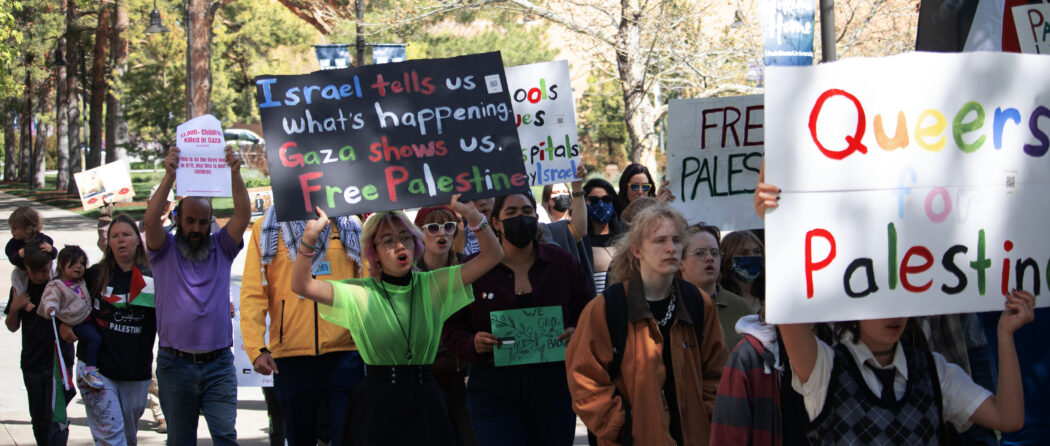Students organize pro-palestine protest
On May 1-3, a protest was held on the Quad of Utah State University to call for a permanent ceasefire in Gaza.
More than 50 people attended the first day of the protest, including USU students and faculty, as well as members of the community. Many protesters wore keffiyehs, a traditional Palestinian scarf, as a symbol of solidarity.
News crews from across the state watched as protestors marched around the Quad, sat in the grass listening to speakers, read names of Palestinians who died as a result of the ongoing Isareal-Hamas war, and worked on signs.
Speakers included Palestinians, activists, politicians and other prominent figures. The protest was organized by four USU students who saw other university protests going on nationwide and internationally.
One of these organizers, Samson Calderón Diltz, wanted to bring something similar to Utah.
“Before the U of U protest, we felt we needed something to happen here in Utah,” Diltz said. “Our main focus was that we wanted it to be peaceful.”
The group’s goals were outlined in a post on their Instagram page, emphasizing their intentions and clarifying that they were not an encampment.
“We stand for and with Palestinians, those martyred, those suffering, those persevering, as well as those who are with us here in Utah,” the post said.
The atmosphere was charged with emotion but remained peaceful, standing in contrast to other campus protests across the country.
Calderón Diltz expressed frustration with the way the media outlets portrayed the protestors’ methods.
“They were here in all six hours the first day just waiting for us to slip up, and when they realized that we actually were nonviolent, peaceful, they described us as subdued and just a handful of students,” Calderón Diltz said.
Grant Amjad Miller, a public defender running for Utah State House of Representatives, spoke on the final day of the protest.
“I find myself in a very unique situation of being a Utahn Palestinian American,” Miller said. “My mom is from the West Bank. She was born in Bethlehem and grew up in Jerusalem.”
Miller spoke about the trials his grandfather faced while living under Israeli occupation and stressed the importance of compassion and change.
“My grandfather, before he died, told all of us don’t just talk about changing the system, get in the system and be that change,” Miller said.
Much of the controversy surrounding the Israeli-Palestinian Conflict comes as a result of a long, convoluted history dating back to the end of the nineteenth century and historical anti-semitism.
However, Kris Carpenter, another one of the protest’s organizers, emphasized that their purpose was calling for a ceasefire, not to promote violence or hate towards Israeli people.
“We condemn any type of that antisemitism or islamophobia,” Carpenter said.
Calderón Diltz shared a similar sentiment when responding to claims of anti-semitism.
“I don’t really understand how to make that connection,” Calderón Diltz said. “There are Jewish Palestinians and there are Christian Palestinians, and there are white and brown and black Palestinians.”
Miller ended his speech with a call to action, emphasizing the importance of activism and passion.
“You are the voice of the next generation. The next attorneys, the next politicians, the next community leaders,” Miller said. “These other folks, they know that at the end they’re not going to win and they’re scared of it, because they know that if they don’t win this then history is going to recognize that they’ve committed genocide.”
Calderón Diltz encourages everyone to come to their own decisions regarding controversial conflicts like this.
“I’m not going to sit here and tell you what you should think,” Calderón Diltz said. “I feel like it’s something that you have to look at for yourself”
Overall, organizers counted the protest as a success.
“This really was like a lovely experience where people could share and educate with each other. It’s just important to see that community come together and have a space to properly grieve and share,” Calderón Diltz said


I’m not sure where Aubrey got her numbers, but I never saw 500 or more people protesting on the first day that there were protests. There may have been 50 people, but not 500.